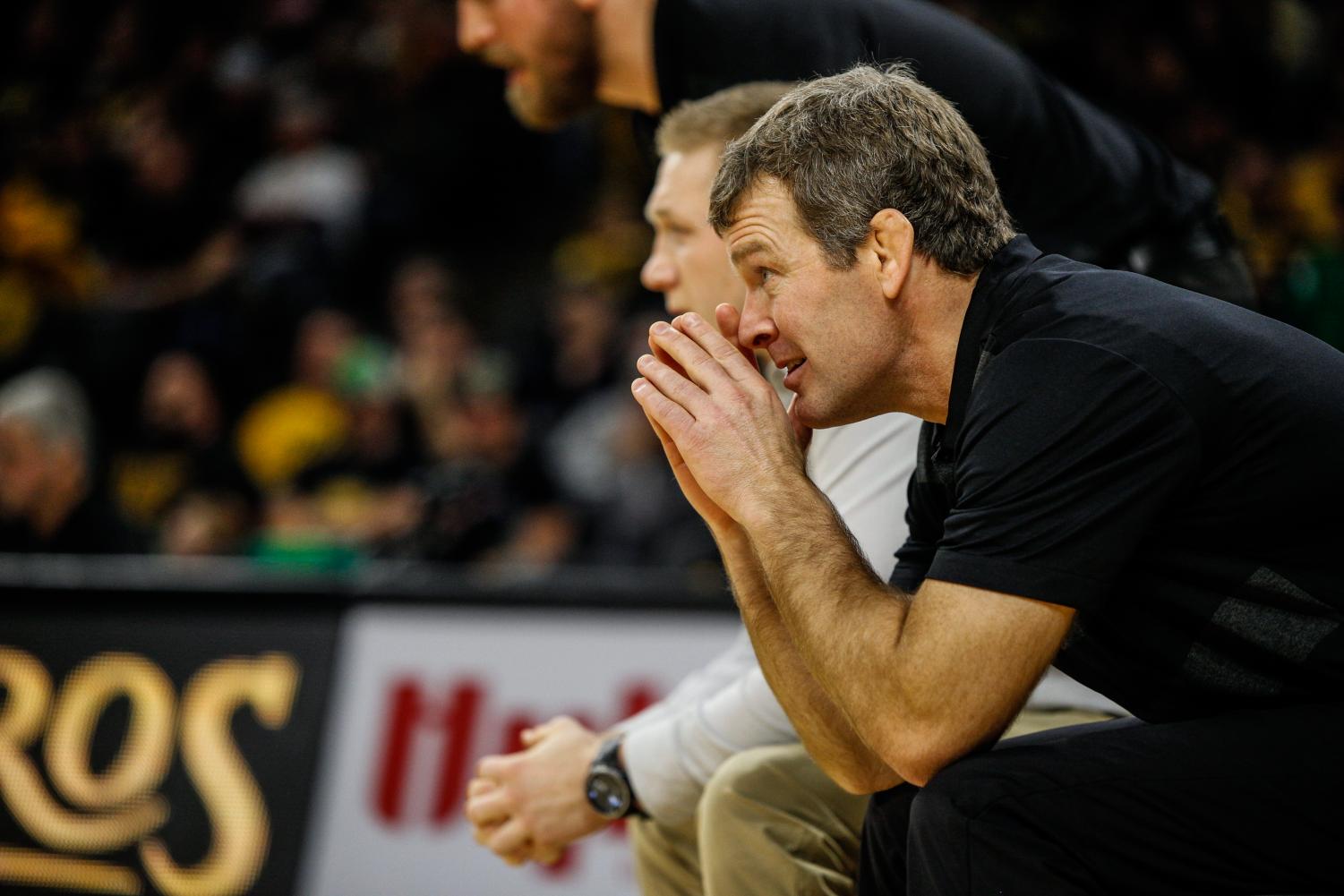Tom Brands leads through accountability in the Iowa wrestling room
Head coach Tom Brands has won and lost at the highest level, and now he's teaching Iowa wrestlers to do the same by being self-accountable.
December 2, 2019
In Tom Brands’ head coaching office, a photo is tacked behind the desk. In it, he is staring at a hawk perched on his arm, and the hawk is staring right back.
The toughness shown in that photo combined with leadership, compassion, and accountability are all needed to lead men to the top of NCAA wrestling are traits that Brands embodies.
The Iowa wrestling program has been built on accountability, and Brands has been at the core of that for 33 years. Whether that mindset continues from the bottom up, from 125-pounder Spencer Lee to last year’s heavyweight Sam Stoll, or from something that runs deep from decades earlier with an icon at the helm, there’s one thing that remains true: competing in a black singlet that features a gold IOWA on the left thigh turns boys into men.
“I don’t believe in senior leadership either, just by the way,” Brands said.
“I believe in leadership — period.”
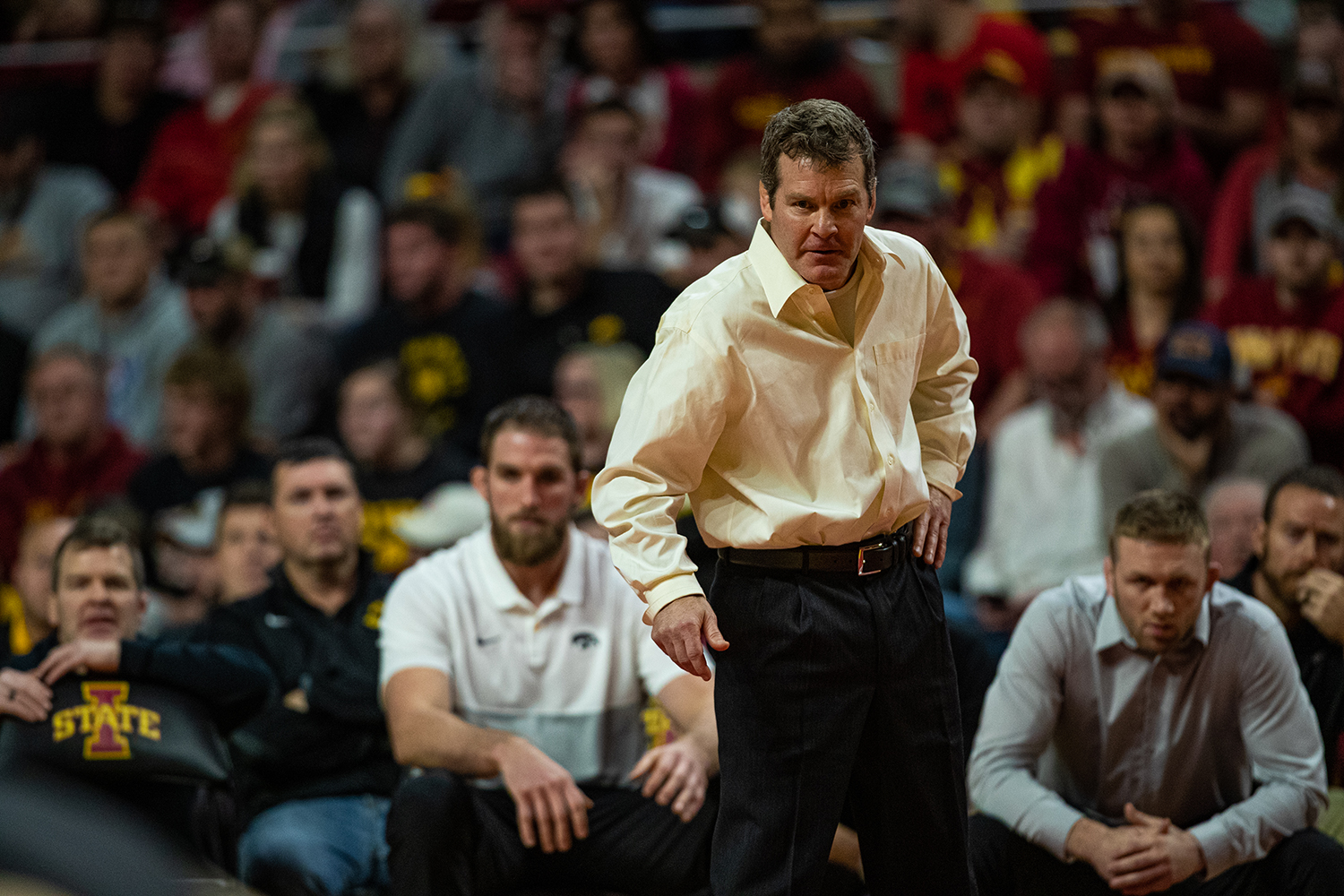
Iowa head coach Tom Brands watches his team compete during a wrestling dual meet between Iowa and Iowa State at the Hilton Coliseum in Ames on Sunday, November 24, 2019. The Hawkeyes defeated the Cyclones, 29-6.
A man among men
Brands’ office in Carver-Hawkeye Arena is exactly what you’d expect. Wrestling posters adorn the walls and a column near the center of the room, and atop his hanging cabinets sit photos of men he’s coached through Iowa’s esteemed and nationally respected program.
Once a three-time national champion and an Olympic gold medalist himself, Brands knows what it means to be a Hawkeye. In college — to go along with his national titles — he was a four-time All-American and a three-time Big Ten champion who went 158-7-2 from 1989 to 1992. Coming into his collegiate career two years shy of Dan Gable’s historic run of nine-straight championships at the helm for Iowa, he soon found himself on the mat with a program that would go for another title run. In 1991, his undefeated 45-0 season helped lead the Hawkeyes to their first of six NCAA team championships in the next seven seasons.
He finished off his collegiate career with an Outstanding Wrestler of the 1992 NCAA Championships honor after winning his third-consecutive individual title. Then, he took to the international stage to continue his success.
Brands won a gold medal at the 1993 World Freestyle Championships, back-to-back gold medals in the World Cup in 1994 and 1995, took home the title of the 1995 Pan American Games, and stood atop the podium at the 1996 Atlanta Olympic Games. In 2001, he was inducted into the National Wrestling Hall of Fame.
Throughout all that time, he never took off the Black and Gold. He served as an assistant to the Iowa wrestling program from 1993 to 2004 while also becoming a coach for Team USA in 2001.
Brands has racked up accolades from both his time on the mat to his time in the corner, but he doesn’t focus on those memories. To him, that’s in the past. That’s no good now.
“I got some good advice a long time ago from somebody,” Brands said. “When you are at the best of the best in your own personal career [or] as a team, duplicate and exceed. Duplicate that and exceed it, and if you’re duplicating that and exceeding it, then you have your eyes on the future.”
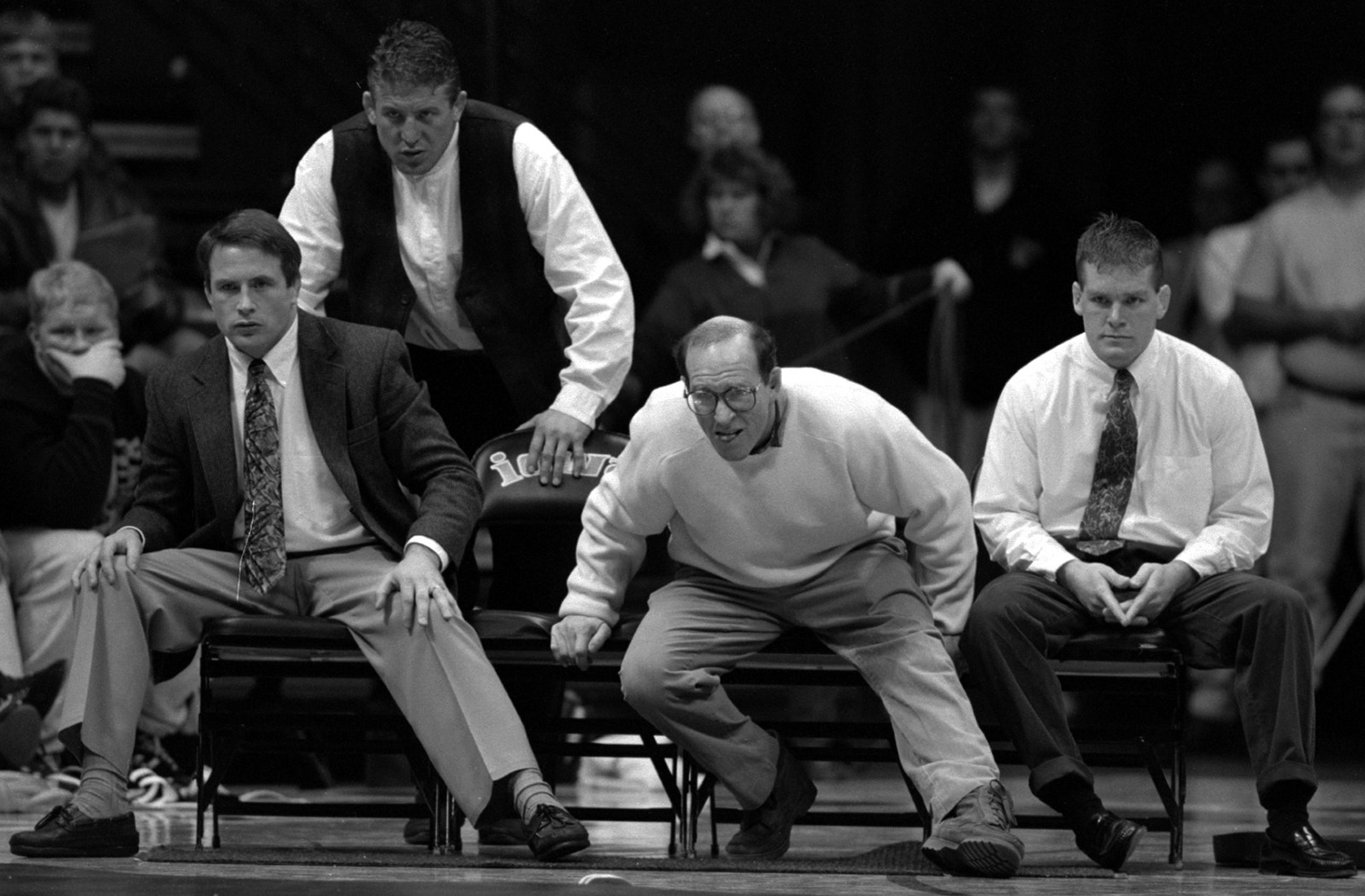
(From left) Iowa assistant coach Jim Zalesky, Royce Alger, head coach Dan Gable and Tom Brands give encouragement during a meet.
The beginning of an era
In 1987, Iowa wrestling had experienced something that it had only encountered once before in Gable’s 11 years as head coach: the Hawkeyes weren’t the best in the nation.
After nine consecutive championships, Iowa placed second by a 25-point margin to Iowa State. Then, in 1988, it happened again. Arizona State bested Iowa by 8.5 points, and Gable suddenly found himself searching for a way to reel the program back into his control and the national respect he had built.
Gable’s standard is high — anyone with a toe in the wrestling world knows that. Before his 21-year tenure as Iowa’s head coach, he lost just one match throughout his high school and college careers and won an Olympic gold medal in 1972 without giving up a point to his opponents.
He kicked up his recruiting efforts for the 1988-89 season, looking not just for good wrestlers on the mat, but for people that would set an example and lead the room.
In Sheldon, Iowa, he found the Brands twins, Tom and Terry.
“It’s double the impact, and it was needed right at that time because, you know, we had great fun and great teams, but coach was losing all control,” Gable said. “I think they exemplified to me what I was looking for in wrestling on the mat and then off the mat as well.
“They were a little bit behind in the room, but they weren’t behind in the competition or how they lived their life.”
Tom and Terry didn’t grow up under the best circumstances. Their father was an alcoholic —described by Terry as “a mean son of a ‘B’ ” when he was drunk — and that helped shape the men they would soon become and the way they would one day lead.
In fifth grade, after their parents divorced, the Brands twins were introduced to wrestling by two family friends. Too small for basketball and just scrappy enough to hold their own in the ring, they were shown a crossface and a cradle.
A couple weeks later, they had their own wrestling mat down in the basement.
“It was an awesome situation because you could fight with your brother under rules that made it OK to be down there scrapping,” Terry said. “It wasn’t, ‘Hey, knock it off,’ from Mom yelling down the stairs anymore. It was a ‘Knock it off,’ and we go, ‘Well, we’re wrestling,’ and ‘OK’ even though it was probably more than that.”
That wrestling turned into a drive and a focus to get better.
They loved to win. Gable came knocking, and their energy and determination was funneled through an organization that was known for cranking out the best.
“Dan Gable was the best thing that ever happened to me in my wrestling career, and my brother would say the same thing,” Tom said. “But not for everybody — for us because of how we were raised.”
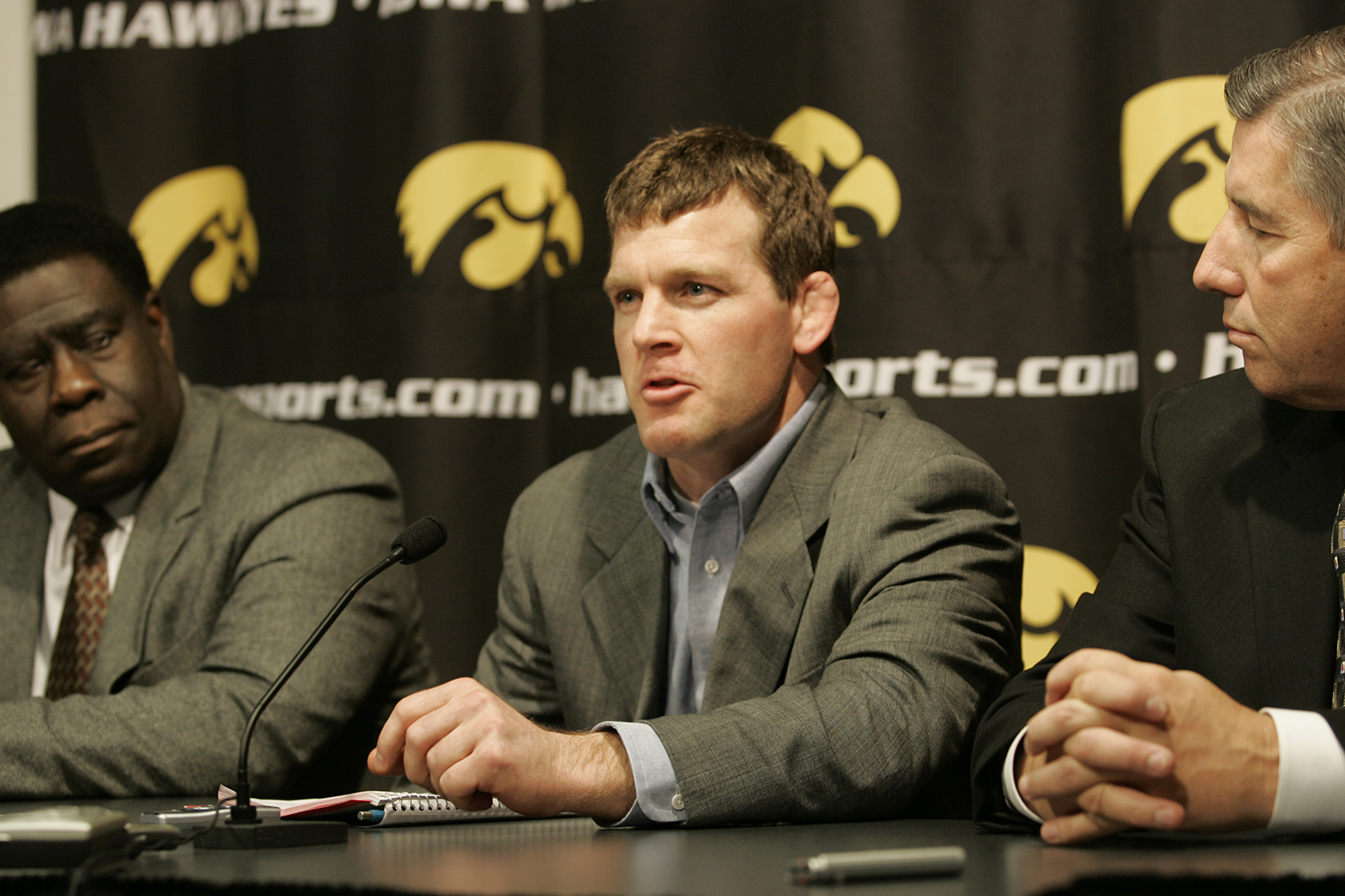
Tom Brands is introduced as Iowa wrestling’s head coach on April 5, 2006.
The student becomes the teacher
Eighteen years later, when then-athletic director Bob Bowlsby called Gable — who was nine years removed from his head coaching days — into his office with a drive to uphold the national status of the program, it was hard to disagree with who he had in mind.
On April 5, 2006, four days before the brothers’ 38th birthday, Tom was named the head coach of the Iowa wrestling program.
“The Iowa program is one of the most decorated sports programs in all of intercollegiate athletics, and with that comes very lofty expectations,” Bowlsby said in his introductory press conference. “We feel that Tom is capable of meeting those expectations and further contributing to our achievements.
“We also feel that Coach Brands will lead the program with high integrity and that he will support our team members in all areas of their experiences on our campus.”
Iowa was coming off a seven-loss season — the program’s most since 1966-67 — but from the moment Tom stepped into the role as head coach, he didn’t feel pressure to return the program to what it once was under Gable.
After Tom left his first head coaching job at Virginia Tech to come back to Iowa, talent followed. Wrestlers he had recruited transferred to Iowa and risked a year of ineligibility, a testament to him both as a coach and as a man.
“When he came in, it was exciting,” former Iowa wrestler and current assistant coach Ryan Morningstar said. “It was like he came in, and it was a new sheriff in town. Everybody bought into what we were doing, and there were some transfers that came in and it was just like we all bonded together.
“Just the leadership and the accountability and straightforwardness that Tom brought to the table was awesome, and just the leadership and the fearlessness that he had was unbelievable.”
Even now, there’s something about Tom and his recruiting efforts that is special, that makes athletes flock to him.
“I’ve had phone calls with recruits where my first phone call is, ‘Hey, you want to be an Olympic champion?’ They go, ‘Yeah,’ and I go, ‘Alright, Iowa’s the place. Any questions, I’ll be in touch later. Goodbye.’ ” Tom said, hanging up the imaginary phone with a clicking noise. “And they’re like, ‘What the heck just happened there?’ And they tell those stories later.
“I think kids want to be talked to that way. Then, let them think about it.”
Accountability, both on and off the mat, is introduced right from the start.
Tom and his staff tackle self-accountability head-on, talking directly to recruits about making good decisions in all facets of life. That paves the way for what is to come in their Hawkeye careers, setting trust up early and planting the seed for stepping up in the room.
“If they want to be a part of a program that isn’t necessarily better than other programs, but is different in that accountability, then sign up for it, because you’re going to thrive,” Tom said.
That accountability showed itself on the mat in a big way last season. On Dec. 1, the annual Cy-Hawk dual meet returned to Iowa City for a matchup between the No. 3-ranked Hawkeyes and the unranked Cyclones.
Iowa State had taken four of the first seven matches and led 15-12 with Iowa’s 285-pound lineup spot coming up. Aaron Costello was listed on the probable lineup prior to the match, and that’s who Tom was expecting to come out of the tunnel.
Instead, when the lights lowered and the Imperial March from Star Wars started blasting from the Carver-Hawkeye Arena speakers, the 6-foot-3 senior heavyweight Sam Stoll walked to the edge of the mat. After a quick exchange that seemed like nothing out of the ordinary to the 9,000-plus people in attendance, Brands gave Stoll a slap across the mouth to get him ready.
Stoll then tied up the team score at 15 with a 5-1 win over Gannon Gremmel.
“He made the call,” Tom said after the meet. “I wasn’t going to let him go, and he explained it to me that it was his last time [in a Cy-Hawk meet], he explained it to me that he wanted to go, and I popped him in the mouth and he went.”
Iowa packed a one-two punch in that meet when Spencer Lee — who went on to win his second national championship last season and is currently seeking a bid to the 2020 Olympics — returned to the mat after a week off and took a major decision over Alex Mackall to give Iowa the bonus point it needed for the win. The Hawkeyes won the dual, 19-18.
Lee shows similarities to the Brands brothers as a wrestler — not only successful on the mat, he shows what it means to be a Hawkeye in life.
A Pennsylvania native, there’s a big wrestling powerhouse school in Lee’s home state where he could have gone. He, like some of his Hawkeye teammates from the same part of the country, chose Iowa.
“[Tom and Terry] want us to be good human beings, not just good wrestlers, and they want us to go and be successful in the future on and off the mat, whatever that means to you,” Lee said. “They’re the best. That’s why I’m here.”
Lee lives through the Hawkeye state of accountability, which helps push that onto his teammates.
“Here’s a guy that’s wired to win the highest level in the sport wrestling matches, and he’s talking about the things that are most important to us,” Tom said. “And it’s not winning at all costs. It’s winning at all costs with integrity and winning at all costs with self-accountability.”
That inaugural 2006-07 season with Tom at the helm culminated in a 14-5 regular-season record, a third-place finish at the Big Ten meet and an eighth-place finish at NCAAs for the second time in five years. Before 2003, the Hawkeyes hadn’t placed that low on the national stage for 30 seasons.
The fear — if any — that Iowa would continue to drop nationally wasn’t something at the forefront of minds in the organization.
“You always have that fear a little bit, because that fear is what lights some fires,” Gable said.
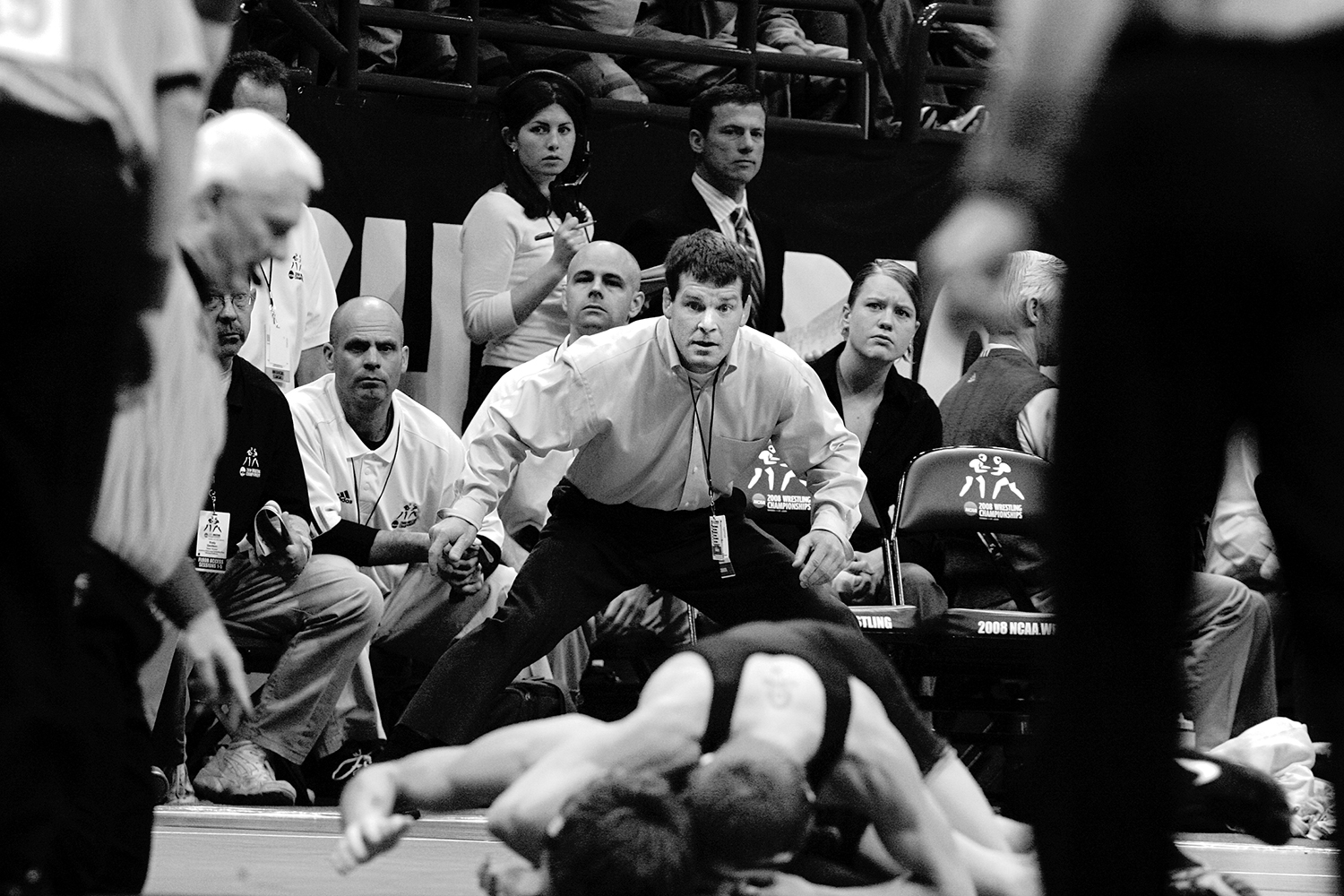
Iowa head coach Tom Brands jumps out of his seat to yell encouragement to Charlie Falck as he locks up Stanford’s Tanner Gardner in the Scottrade Center on Friday, March 21, 2008. Falck later lost in the semifinals to Indiana’s Angel Escobedo.
Three consecutive championships
After tabbing Iowa’s first NCAA champion in two years in 2007, Tom had something — however small — to build on.
Mark Perry was back after winning the 165-pound individual title during his junior season, and next to him came the now-eligible transfers from Virginia Tech.
“It was getting an avalanche of guys in there,” Tom said. “When you’re putting a team together, you have to have a majority of good people that have this blend of accountability for the sport of wrestling, accountability for your social life, and accountability for your academics.
“We had that quickly, and then we needed to continue that.”
In 2008, seven Hawkeyes earned All-American honors to win the team title with 117.5 points — 38.5 more than second-place Ohio State. Perry repeated as the 165-pound champion, and Brent Metcalf was named the Outstanding Wrestler after winning the 149-pound title. It was the first time since 2001 that Iowa had more than one individual champion.
That success came from the wrestlers on the mat, of course. To get there was a journey in itself that involved all 38 wrestlers on Iowa’s roster and one of the most difficult levels of accountability to go through.
Two-time All-American Daniel Dennis was a backup that year, staying ready in the room while working as a training partner to wrestlers that would stand on the podium in March.
“There was some talk of transferring and that was never an option in my head just because of how the coaches were and how committed I felt they were to me, developing me and getting me better,” Dennis said.
That accountability factor — both in life and in wrestling — was heightened when Terry was added onto the coaching staff before the 2008-09 season. Tom wanted his brother, and no one else. He kept a coaching position vacant for months until Terry decided to return home after spending the previous three years with USA Wrestling.
Like so many others that come back to help, he wanted to give back to the program that gave him so much. Together, Tom and Terry show athletes the level of accountability that Gable instilled in them.
“You never turn a blind eye as a coach,” Terry said. “I don’t turn a blind eye; it doesn’t matter what level they are. It doesn’t matter what level they think they are, whether it’s [Austin] DeSanto, Spencer Lee, or an incoming freshman. You correct the problems as they go on.”
In 2009, Dennis took the 133-pound spot in the lineup and placed seventh at NCAAs as Iowa went on to beat Ohio State again, this time by just 4.5 points.
In 2010, its third-consecutive national championship and its last to date, Iowa put eight wrestlers on the podium with All-American honors. The Hawkeyes didn’t have that many All-Americans since the final year of Gable’s tenure. It won the title with a 44.5-point lead on second-place Cornell.
“Tom set a bar of the standard of the program, which was set by Gable before him, [former head coach Gary] Kurdelmeier [before him],” Morningstar said. “We wanted to get it back on the map.
“The standard was set, and we did everything in our power to uphold that standard.”
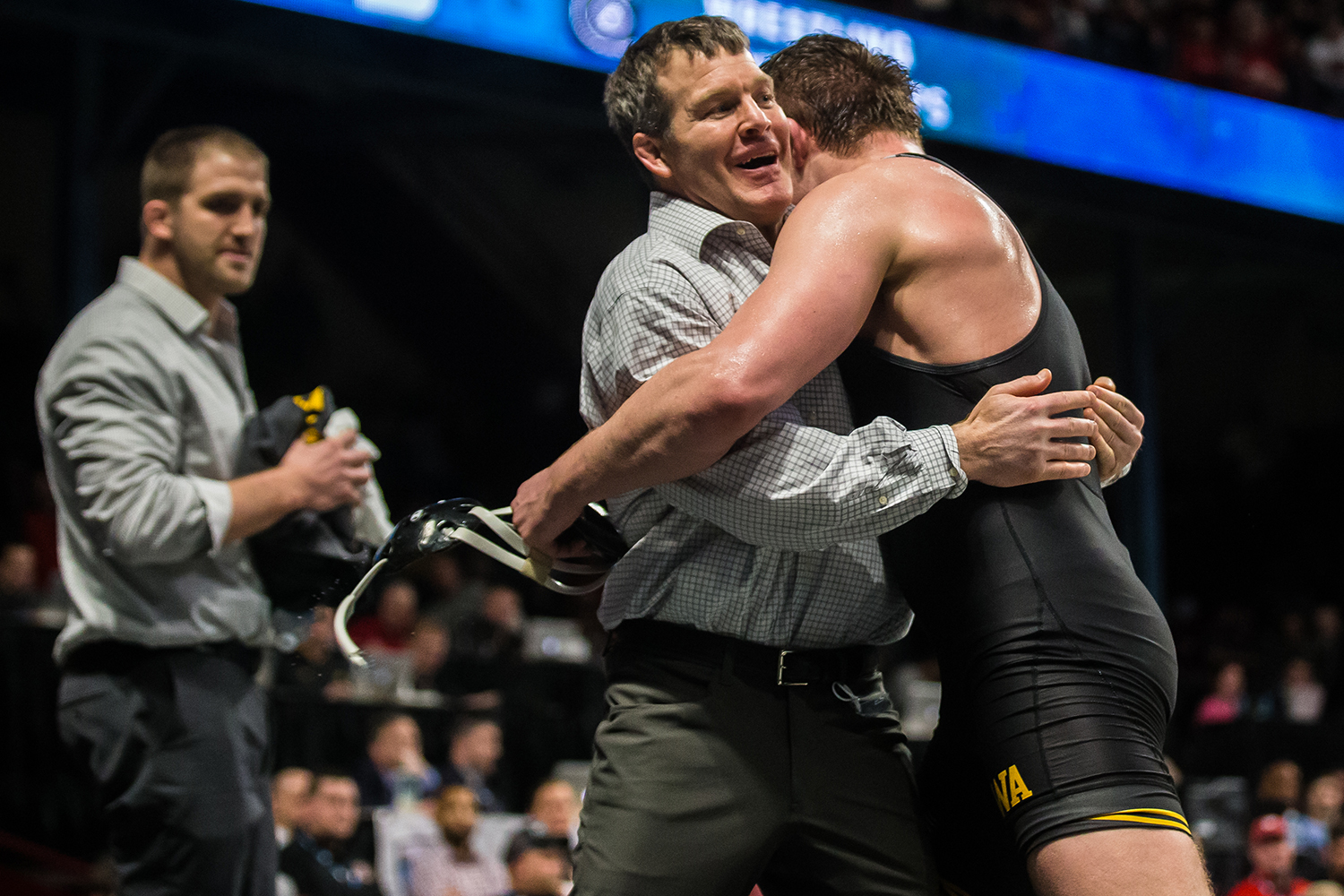
Iowa’s 197-lb Jacob Warner hugs head coach Tom Brands during the fourth session of the 2019 Big Ten Wrestling Championships in Minneapolis, MN on Saturday, March 9, 2019.
Duplicate and exceed
Now, Iowa is ranked No. 1 in the nation, and on Dec. 1 notched a 32-3 win over No. 6 Wisconsin for Tom’s 100th Big Ten dual win as head coach.
The Hawkeyes are one of two favorites to win the NCAA team championship in March. The 2010 championship was Iowa’s last, the longest stretch without a title for the Hawkeyes since the program won its first in 1975 under Kurdelmeier.
The team has been in the top five in those nine years, but that hasn’t been good enough.
“The criticism of Tom Brands is Tom Brands’ words,” Tom said. “ ‘You haven’t won since 2010’; I say that. I’m the one that says that. The time to win is now. We need to perform better, we need to do a better job, I’ve said that.
“The pressure — if you use that word — comes from me. I competed at the highest level and won at the highest level, and also competed at the highest level and didn’t win at the highest level. I know the difference of what it feels like.”
The last time Iowa had more than six All-Americans was 2010. This season, all six of Iowa’s 2019 All-Americans are returning, plus two-time All-American Michael Kemerer, who sat out last year with a torn ACL and a shoulder injury that both required surgery.
This season is the one that Iowa fans have been waiting on. In the culture that Tom has built, however, waiting was never an option.
“The thing is, I know everybody’s really excited about this year for some reason, but I’ve been excited every year that I’ve been here,” Terry said. “Last year, the year before, the year before, the year before, I thought we had the lineup to win.”
That accountability factor is important in a big way as the stakes build toward NCAAs. There are things that Iowa’s entire lineup can improve on to achieve the goals it has set — and that have been set upon it.
“The team really is very accountable towards me just as I hold my teammates accountable,” Lee said. “I think that really does stem from the coaching staff — all of them, Morningstar, [Bobby] Telford, Terry, and Tom — they do an awesome job making sure that everyone holds each other accountable.”
Iowa’s ultimate goal as a team — to grab the first-place trophy at NCAAs in March — will come from individual wrestlers reaching their own goals.
At 125, Lee is going for an NCAA title as well as a bid to the Olympics.
At 133, DeSanto is still maturing in his wrestling, thinking carefully before his next move.
At 165, Marinelli is transforming from a pinning mentality to a point-scoring mentality while trying to avenge his 2019 NCAA quarterfinals loss.
“I know that if our guys do what they’re capable of doing and make the adjustments that they need to make on a daily basis, they’re going to get what they want,” Tom said. “I’ll tell you what, when you got 10 weight classes that are getting what they want, that’s a good formula for success.”
There were six years under Gable when Iowa had nine All-Americans — 1981, 1983, 1985, 1991, 1992, and 1995 — and in each of those years, a team title was won. That’s as close as the program has come to 10 weight classes getting what they want. In one of those years, 1992, both Tom and Terry were national champions.
His three national championships and his contribution — both on and off the mat — to helping the team climb back on top, Tom met Gable’s high standard as a wrestler.
“Of course he did,” Gable said.
Meeting that standard as a coach, however, is something entirely different. Despite that, it’s not a challenge that Tom has — or probably ever will — shy away from.
“I never saw the fear in his eyes that he couldn’t bring a team to winning national titles — I’ve never seen that fear; I’ve only seen determination,” Gable said. “It’s hard to see sadness in him, but I’m sure there is at times. That sadness is almost like a determination more in his eyes. With that in mind, you’re always looking up.”
Now, Brands is looking for his wrestlers to meet a new standard — his own. That stems from something that he pushes for every day — not senior leadership, but leadership, period.
For junior and two-time All-American Alex Marinelli, doing things the right way is at the forefront of everything he does. So, when the time presented itself, he stood in front of his teammates to preach what the program is all about.
“If you want to soar with the eagles, you can’t hoot with the owls,” Brands recalled him saying.
And to the head coach of Iowa wrestling, it was just corny enough to get the job done.
